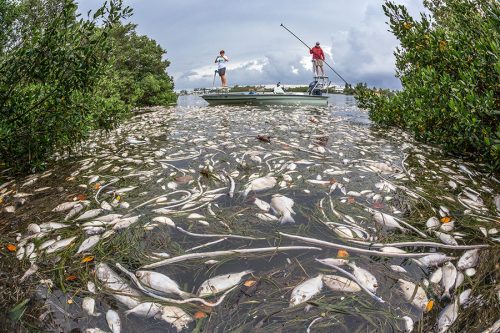GAINESVILLE, Fla. — Florida Museum of Natural History visitors can learn about red tide and blue-green algae in the new “Toxic Algae: Florida’s Summer of Slime” exhibition now open in the Denny Gallery.

This free exhibit features high-resolution images by nature photographer John Moran showing the effects of both algae blooms on Florida waters and beaches. Educational panels explain the differences between the two, the science behind them and what people can do to help. Florida Sea Grant Director Karl Havens provided the exhibit’s scientific content.
“There is a lot of confusion out there about Florida’s algae outbreaks,” said Julie Waters, Florida Museum exhibit coordinator. “We hope that this exhibit will help answer some of the questions visitors have and encourage them to learn more about this timely topic.”
Algae blooms throughout the state over the past 12 months have caused the deaths of thousands of sea animals and forced the closure of many South Florida beaches, affecting businesses and tourism. Heavy bloom outbreaks are known to especially affect those with asthma and skin or other allergies. According to the National Oceanic and Atmospheric Administration’s National Ocean Service, the red tide bloom has stretched for more than 150 miles along the southwest coast of Florida from Pinellas to Collier counties.
“It has been a very challenging, even heartbreaking, year for Florida’s waters,” said Darcie MacMahon, the museum’s director of exhibits and public programs. “We wanted to explore what has happened and why, believing that understanding is a first step toward creating solutions.”
For more information, call 352-846-2000 or visit www.floridamuseum.ufl.edu/exhibits/algae.
-30-
Writer: Nikhil Srinivasan, 352-273-2034, nsrinivasan@flmnh.ufl.edu
Sources: Julie Waters, 352-273-2073, jwaters@flmnh.ufl.edu
Media contact: Paul Ramey, 352-273-2054, pramey@flmnh.ufl.edu